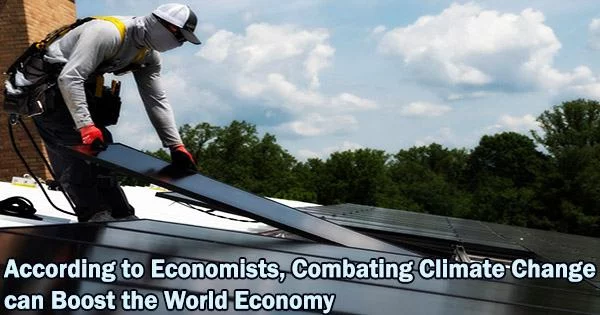The recovery of the global economy from the coronavirus epidemic may be significantly aided by increasing investment in policies and technologies to combat climate change.
Charles Dumas, chief economist of the U.K.-based investment research firm TS Lombard, stated recently that people frequently criticize climate change action as proceeding too slowly. However, they might begin catching up if governments increase investment to support their post-Covid economies.
According to data from TS Lombard, one of the fundamental tenets of this is the steadily declining cost of power per megawatt hour, with costs of solar, offshore, and onshore wind falling over the last 10 years, while gas and coal have mostly remained the same.
“Effectively by 2030 the cost of renewable electricity is going to be half that of coal and gas sourced electricity,” Dumas told CNBC.
These trends will bring many of the various pledges to reach net zero more closely in sight.
The recent tragic floods in Germany have brought the effects of climate change back into sharp focus, but they are merely the most recent in a string of recent catastrophic severe weather events, including the raging wildfires in Oregon.
COP26 priorities
In this context, Glasgow will play host to the COP26 United Nations Climate Change Conference in November. One of the most major global climate conferences since the Paris Agreement, it will be.
According to Dumas, as COP26 draws near, countries must be aware of their top objectives. Infrastructure expenditures ought to be one of them because several scientific and engineering obstacles to renewable energy continue to exist.
“I think the intermittency problem is pretty serious and it’s not just that the sun goes down at night,” Dumas said.
Depending on where infrastructure like solar farms are located, solar electricity output can vary.
“There’s huge variation with sunny days in winter and sunny days in the middle of summer so the intermittency takes on a very big seasonal aspect,” Dumas said.
“You can have vicious weather for a long time in the middle of December or January and lo and behold you wouldn’t want to be depending on solar power.”
“Energy transmission could be another bottleneck,” he said. The poor world, particularly several African countries, has a lot of potential for building solar power production sites, but that power needs to be portable.
“The issue of transmission technology is really major. If you want Chad to be the new Saudi Arabia, because of the Sahara Desert there’s a lot of sun there, but you want the electricity to be used in Europe then you’re talking about some expensive processes and processes needing a lot of research and a lot of further investment.”
“Storage and carbon capture are all areas that require hefty investment,” Dumas added, if governments are to reach their net-zero targets.
“What we need is a very clear public policy lead in order to get anywhere near these net zero promises and I suspect that actually what it’s going to be about is a carbon tax, which the Americans may resist but will be necessary,” he said.
Job creation
According to Paul Steele, chief economist at the International Institute for Environment and Development, an independent policy research organization, investments in renewable energy will help address the climate catastrophe while also generating jobs for the post-Covid economy.
“One of the priorities coming out of Covid is to create labor intensive employment. Both in developed and developing countries, you can provide labor intensive employment through renewable energy,” Steele said.
One example, he said, was the retrofitting of boilers in homes in the U.K., which would help push the country toward its climate targets and create new jobs while being relatively inexpensive in the grand scheme of things.
Steele said that investments to drive a climate-friendly economy cannot be short term or have quick goals.
He pointed to the various government support schemes for the airline industry, which has been battered by the pandemic. Just this week, the European courts gave the nod to a $2.9 billion bailout for Air France-KLM’s Dutch business.
The airline industry should make sustainability obligations in exchange for bailout funding, he added, but getting there can be tricky.
“Governments aren’t making the connections enough and traditionally treasuries and particularly the ministries of transport are still dominated by road building lobbies and people who like to build highways and increase transport rather than people who want to invest in sustainable alternatives.”
















